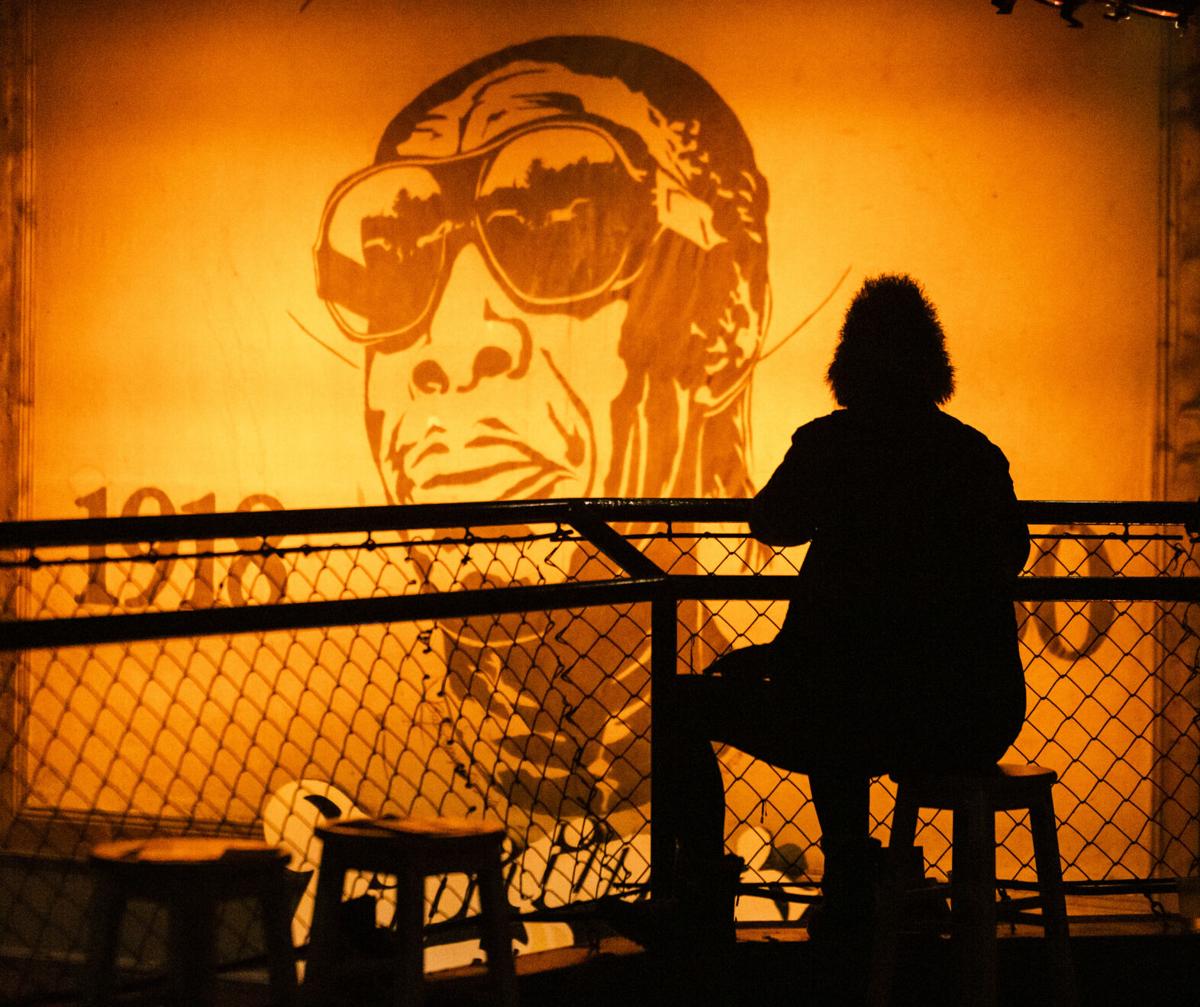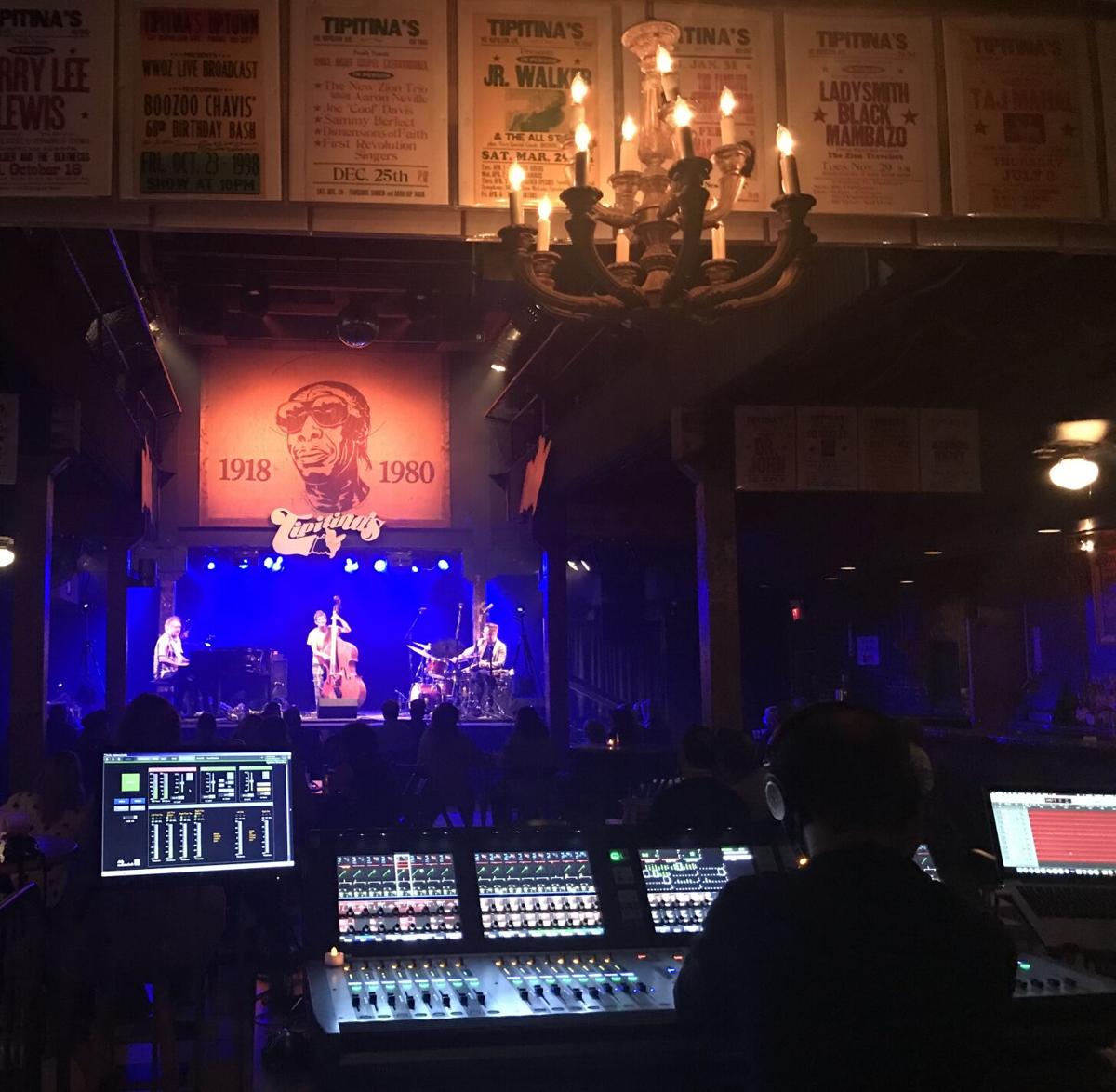
A person watches from the balcony as Ivan Neville performs during Tipitina’s first open-to-the-public show in a year in New Orleans, La., Friday, March 19, 2021.
- Photo by Sophia Germer, NOLA.com, The Times-Picayune | The New Orleans Advocate

The Stanton Moore Trio performs at Tipitina’s on Thursday, March 18, 2021 for a small, seated audience of invited guests. It was the first show at Tipitina’s with an audience since the coronavirus pandemic started a year earlier. The club’s new, portable sound and light control system, which replaced a booth near the back of the club, is visible in the foreground.
People sit at tables before Ivan Neville performs during Tipitina’s first open-to-the-public show in a year in New Orleans, La., Friday, March 19, 2021. (Photo by Sophia Germer, NOLA.com, The Times-Picayune | The New Orleans Advocate)
Tipitina’s officially reopened with Ivan Neville’s two sold-out shows on March 19. They were the famed venue’s first shows in a year to which the general public — only 75 per show — could buy tickets.
But the club had already welcomed its first in-person audience of the coronavirus pandemic era the previous night. On Thursday, March 18, Galactic drummer and Tipitina’s co-owner Stanton Moore and his jazz trio livestreamed a crackling good show with 50 or so invited guests in attendance.
As a practical matter, the March 18 gig was a test run for the club’s COVID-19 protocols: temperature checks at the doors, reserved seats at tables on the first floor and stools along the second-floor balcony, servers taking drink orders, mandatory masks, no dancing, etc.
But that show also served a more spiritual purpose as a morale boost and statement of resolve. For Tipitina’s to once again host an exchange between audience members and performers was a welcome step back to New Orleans normalcy.

Perhaps no one was more stoked than Stanton Moore. In high school, he attended music workshops at Tipitina’s on Sunday afternoons. Galactic cut its teeth at Tipitina’s. In late 2018, Moore and his bandmates went out on a limb and bought the historic venue.
Little more than a year later, the pandemic forced them to close the doors. They’ve since scrambled to pay the mortgage, utilities, staff and other expenses, while also losing their individual incomes as touring musicians.
That Moore’s audience for his first show back at Tipitina’s consisted of only a handful of people didn’t much matter.
“You hear that? That is tens of people, socially distanced, COVID-compliant, responsible and safe!” he enthused at the start of the set. “We’re not out of the woods yet, but this all feels like steps in the right direction.”
He, bassist James Singleton and keyboardist David Torkanowsky have livestreamed shows during the pandemic. But that wasn’t the same as playing for people.
“What a pleasure it is to play for even a small audience,” Moore said. “Tork and James and I have been dreaming about this moment. We can’t tell you how much this means to us.”
“It’s very healing,” Torkanowsky added.

The Professor Longhair bust wears a face mask as Ivan Neville performs during Tipitina’s first open-to-the-public show in a year in New Orleans, La., Friday, March 19, 2021. (Photo by Sophia Germer, NOLA.com, The Times-Picayune | The New Orleans Advocate)
STAFF PHOTO BY SOPHIA GERMER
Moore continued, “I know this is a different experience for Tipitina’s. But we knew that when we came back we’d have to come back gradually and grow it. We want to be smart, we want to be responsible. … Thank y’all for trusting us to provide something different for you here in this hallowed building that we call Tipitina’s.”
He always looks happy behind the drums. On this night, he looked downright ecstatic, even while wearing a mask.
Everybody was having fun. At one point, Torkanowsky seemed to improvise a call-and-response with a passing train’s whistle, clearly audible through the club’s open doors.
The trio played mostly material by New Orleans composers, including “Miles” by saxophonist Tony Dagradi, Singleton’s bandmate in Astral Project. Long ago, Dagradi was a member of New Orleans piano legend Professor Longhair’s band, as was Astral Project drummer Johnny Vidacovich, who was one of Moore’s mentors.
“It’s funny,” Moore said, pointing up to the Longhair banner above the Tipitina’s stage, “how all things seem to come back to Professor Longhair in New Orleans.”
He noted how meaningful it was for him to perform on the same stage where he learned to play at high school workshops.
“Not only as a drummer,” Torkanowsky interjected, “but as an owner.”
“Well, I don’t want to get too far into that,” Moore replied. “Right now, I’m just trying to be a drummer.”
With that, they eased into a jazzy take on “Tipitina,” the Longhair song for which the club is named.

Staff Photo by Sophia Germer, NOLA.com, The Times-Picayune | The New Orleans Advocate
Just as the song “Tipitina” was clearly recognizable but slightly different, so was the club, thanks to some changes and upgrades made during the year it was closed.
The unwieldy speaker stacks that flanked either side of the stage were replaced with a much more streamlined sound system suspended from the ceiling.
The beam with the basketball hoop that previously bisected the second-floor cutaway — and obstructed the view of the stage from the balcony — has been removed.
The sound booth at the back of the room was also removed, replaced by a portable sound and light control panel.
A new banana logo sign hangs above the front entrance where the old Dixie Beer-branded Tipitina’s sign used to be. The whole exterior received a fresh coat of “Tipitina’s yellow” paint.
Innovations born out of pandemic necessity will likely endure.
Outdoor, early evening sets on the sidewalk have proven to be popular.
So, too, the Tipitina’s Record Club, in which subscribers receive vinyl LPs of limited-edition recordings. The Record Club’s first release, rolled out in February, was of a Professor Longhair house concert from 1973. Next up: a Radiators show recorded at Tip’s in 1997, followed by a 25th-anniversary edition of Galactic’s debut album, “Coolin’ Off,” and a 1978 solo James Booker show at Tipitina’s.
Tipitina’s now has a strong online/YouTube presence, thanks to the “Tipitina’s TV” webcast shows and “The Alright, Alright Broadcast,” a series of in-depth interviews with musicians and people connected to the local music industry conducted by Tip’s general manager and former radio guy Brian “Tank” Greenberg.
During the day, the HEY! Café & Coffee Roastery has operated out of a Tipitina’s side window. During Carnival, the club partnered with Bywater Bakery to sell and ship king cakes.
Given all this, Moore, for one, is optimistic about Tipitina’s future. Torkanowsky cited another example of that optimism onstage during the March 18 gig: the club’s expensive new digital piano.
That investment reflects the fact that intimate, piano-driven performances will likely dominate the reduced-capacity Tipitina’s schedule for a while. Torkanowsky, who lobbied hard for this particular purchase, gave the piano a workout with Moore’s trio.
Ivan Neville made it sing the following night. On Friday, Jon Cleary will take a turn on it for two sold-out shows.

Staff Photo by Sophia Germer, NOLA.com, The Times-Picayune | The New Orleans Advocate
Despite all the pandemic-born side hustles, the primary business at Tipitina’s was, and is becoming once again, live music. Moore, Torkanowsky and Singleton made that abundantly clear on March 18.
Toward the end of their set, which is available on the Tipitina’s TV YouTube channel, they conjured a lovely, intimate arrangement of “All These Things,” the Allen Toussaint composition popularized by Art Neville. Moore dedicated it to his wife, Lauren.
They concluded with Robert Walter’s funky “Maple Plank” and an encore charge through the Meters’ “Welcome to New Orleans.”
But the night’s theme was really, “Welcome back, New Orleans.”
And welcome back, Tipitina’s.

